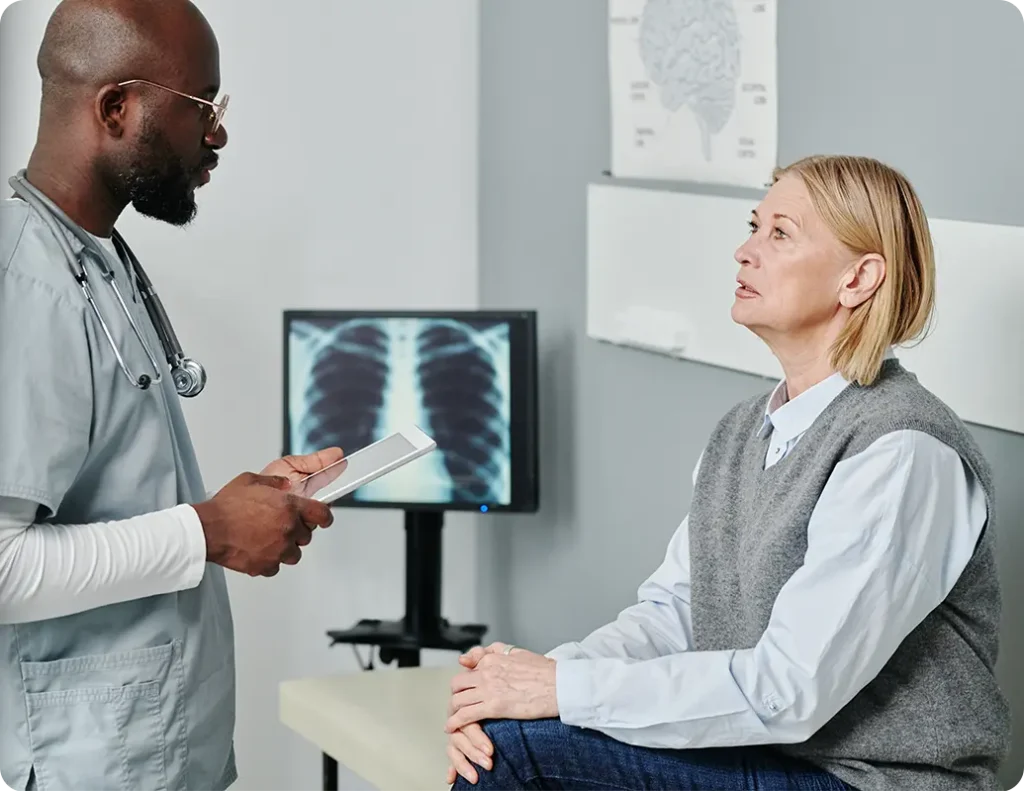
Many doctors and medical professionals specialize in diagnosing and treating lung cancer (speak with your medical team for details).
These experts form a comprehensive team to provide your care. Having an integrated, expert team and knowing what questions to ask them can help you receive the best treatment for your lung cancer.
Use the following questions below to ask at each step of your newly diagnosed patient journey.
Knowing the specific type of lung cancer helps determine the
most effective treatment options.
Understanding the types of specialists involved ensures comprehensive care and coordination.
Experience and expertise can significantly impact the quality of care and treatment outcomes.
Accurate staging through appropriate tests is crucial for developing an effective treatment plan.
The stage of cancer influences the treatment strategy and prognosis.
Exploring all treatment options and understanding the rationale behind recommendations helps in making informed decisions.
Seeking a second opinion can confirm the diagnosis and treatment plan or provide alternative options.
Clinical trials may offer access to new treatments and asking about them helps evaluate all potential options.
Board certification indicates a recognized level of expertise and commitment to ongoing education.
Staying informed about the latest treatments ensures the care provided is based on the most current medical knowledge.
Experience with a specific surgery can correlate with better outcomes and fewer complications.
Speaking with other patients can provide insights and reassurance about the treatment process and outcomes.
Knowing the doctor's availability for questions ensures continuous support and communication.
Direct answers from the doctor help in understanding the treatment and making informed decisions.
Prompt responses to phone calls ensure timely communication and address urgent concerns.
Respecting the patient's decision-making style fosters a collaborative and respectful patient-doctor relationship.
Confirming insurance acceptance ensures that the treatment will be covered and affordable.
Knowing the credentials of backup care providers ensures continuity and quality of care.
Participation in clinical trials may offer additional treatment options and access to cutting-edge therapies.
Understanding the types of specialists involved ensures comprehensive care and coordination.
Experience and expertise can significantly impact the quality of care and treatment outcomes.
Accurate staging through appropriate tests is crucial for developing an effective treatment plan.
The stage of cancer influences the treatment strategy and prognosis.
Exploring all treatment options and understanding the rationale behind recommendations helps in making informed decisions.
Seeking a second opinion can confirm the diagnosis and treatment plan or provide alternative options.
Clinical trials may offer access to new treatments and asking about them helps evaluate all potential options.
Board certification indicates a recognized level of expertise and commitment to ongoing education.
Staying informed about the latest treatments ensures the care provided is based on the most current medical knowledge.
Experience with a specific surgery can correlate with better outcomes and fewer complications.
Speaking with other patients can provide insights and reassurance about the treatment process and outcomes.
Knowing the doctor's availability for questions ensures continuous support and communication.
Direct answers from the doctor help in understanding the treatment and making informed decisions.
Prompt responses to phone calls ensure timely communication and address urgent concerns.
Respecting the patient's decision-making style fosters a collaborative and respectful patient-doctor relationship.
Confirming insurance acceptance ensures that the treatment will be covered and affordable.
Knowing the credentials of backup care providers ensures continuity and quality of care.
Participation in clinical trials may offer additional treatment options and access to cutting-edge therapies.